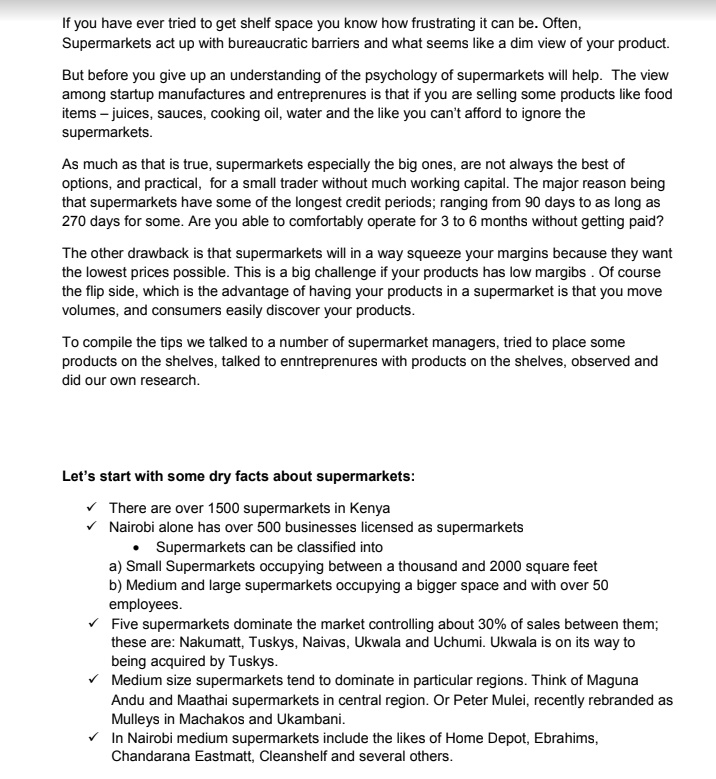Supermarket Shelf Space Business Plan
Supermarket Shelf Space Business Plan

Supermarket Shelf Space Business Plan Overview
This is a Smokies & Eggs Vending Business Plan to the standard Smokies & Eggs Vending Business . If you have ever tried to get shelf space you know how frustrating it can be. Often, Supermarkets act up with bureaucratic barriers and what seems like a dim view of your product.
But before you give up an understanding of the psychology of supermarkets will help. The view among startup manufactures and entrepreneurs is that if you are selling some products like food items – juices, sauces, cooking oil, water and the like you can’t afford to ignore the supermarkets.
As much as that is true, supermarkets especially the big ones, are not always the best of options, and practical, for a small trader without much working capital. The major reason being that supermarkets have some of the longest credit periods; ranging from 90 days to as long as 270 days for some. Are you able to comfortably operate for 3 to 6 months without getting paid?
The other drawback is that supermarkets will in a way squeeze your margins because they want the lowest prices possible. This is a big challenge if your products has low margins . Of course the flip side, which is the advantage of having your products in a supermarket is that you move volumes, and consumers easily discover your products.
To compile the tips we talked to a number of supermarket managers, tried to place some products on the shelves, talked to entrepreneurs with products on the shelves, observed and did our own research.
Let’s start with some dry facts about supermarkets:
- There are over 1500 supermarkets in Kenya
- Nairobi alone has over 500 businesses licensed as supermarkets , Supermarkets can be classified into: Small Supermarkets occupying between a thousand and 2000 square feet . Medium and large supermarkets occupying a bigger space and with over 50 employees.
- Medium size supermarkets tend to dominate in particular regions. Think of Maguna Andu and Maathai supermarkets in central region. Or Peter Mulei, recently rebranded as Mulleys in Machakos and Ukambani.
- In Nairobi medium supermarkets include the likes of Home Depot, Ebrahims, Chandarana Eastmatt, Cleanshelf and several others.
- Since 2015 supermarkets have had mixed fortunes. Uchumi almost went down due to mismanagement, while Ukwala and Nakumatt have reported losses. Ukwala has since sold a stake to Choppies from Botswana, while Nakumatt as of October 2016 is said to be shopping for a strategic investor.
Its important to note that supermarkets are becoming more powerful as more consumers choose them , rather than retail shops and kiosks, as their main venues. This means that they have more say in negotiating for prices and even what to place on the shelves and what not to.
Another recent trend is private labels , where supermarkets firms to package products under their own brands. Think Nakumatt Ice Cream, Crisps and so forth. This is usually in partnership with manufacturers. The significance of this is that private labels are more profitable to the supermarkets, and they are taking up more space which otherwise would have been allocated to other brands.
Download Supermarket Shelf Space Business Plan / guide here